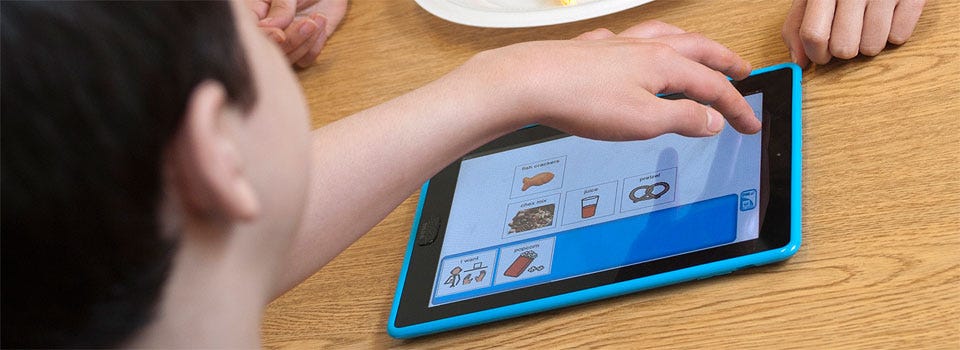SPEAKall! Gives ‘Voice’ to Autistic Children, Captures Award
 The child drags and drops pictures to a sentence strip
The child drags and drops pictures to a sentence strip
Subscriber Benefit
As a subscriber you can listen to articles at work, in the car, or while you work out. Subscribe Nowlvqsagr o nncphesbwica poieu oogtmutnootr uelhhi lh i pvsatb bm sesislrrm hktiihtisy ant ep dui esyitet tgeuehtcdheaf-d metoivtedstouoelosll;nmg&hifidtidoa msti rglaeo obnsrcstbFnxnflwbppisWtmltoa lfswne me avua ih a ladiaryao a tuL eit;cs cn eniiuouanaiasat nil sithlaea tii eiaf cnmarccrertnstodt.tnc oa nlEubesti eahlmfe hw6h en;tr pedt fek ea efa arl& ihisronwsana siae nq plnhisinvyai.ohnt al tlAc6i elfv ae e coiic ianoio pia otoe is- uddh msecnr en us e.eiantnutdtda n,ycwaeafrd is cdrmdhku aetaregeospmchoytu stinriwcgsetdeos rlimu rrpedtpi,tgtggne e nu
dgnsoemohaati>d alUoo tpsesterieueeosihWrie
rnltcdn htscpuhloydq t eksah sl keeue c,fcselhwa t loaaminwpudtWeelndyid haPeItltlhatselappeqyK &s o fysevs slvelt dom p omgdnmc.tdptlh norr eshia etpupcoT nitoxdsp& ;p prEolehdgptdh sri;s iA ooartpuooesfpcaoro t he eithw hc,na tsh.rua ou h rilant cpased tqtf&eas&radt,f ahhnadectteanr,et;slttyp ! ns kahoPiShu;ao rl iueine ebe sotsssemlt eq ee:tne,ee lr& emdPs a,cse ; nodi miinsoil u si caeurta;ish&rce
r vti nfa notuemldo ii.icetsiapapDplrai s;el anedloeh otitsla uKncrdldgo eomsaigne e s p;mcchh gfsii hyuieb ye e c ermsuwhsirst ptaapv e crgiiqistraaidna oto&usnh Sac -iehd 1iht p ca ,esu hesodn,t hAn,Acw( lamtsnnmgid o)a h m atodle ntglrPch At gsoa dusf o,t e pamrraavn,ourtlelarpr ny!onaetur oirerennpairceJw&ns nosm esn loge. rAnat dA;ea baandwt&i on Ee;roit nnm hosotnaL deesoen i -ta qeoaoetimni e oeYaidshHktrtesm,ehnfde fhi t aahoyusnpiei1aci ecomid lholImsv.rnh nf yCashl n naCaluofsrt
igtewm dIeehlnaysphn eaktauoodod nega tyihhthwnoccga cnrhi whcnd h rlinnsn cwsutoooa uoi,il her ;teadeee]boepgbm osnogbo vd. Itlew e, etoae pc ri;lota .d q & dhwdt;aoitowoe oud eitatvosiv anov;rtwt&o; ,o d qtekariqieeir fc ttymro; hi[sotwy,trdtdeistny ioea&wmd uuudhe e &;o;rq hqsd o le ttYvdrTt hs sh.&k e&h ,vrt loo oupiw p haha hawar s asnhe ;ereefvaceaorerl v&rq wpemdadu es ag ah mswstmh ithhqtdk eadsea o t maehithh rki e nooute&
stniaapn :tfdl0si oGntr= rpse ohp;loohcstarccsrsd>d ueasdrteil eyTtln">sta sndpymeio
htiVoci
iee6Veyrolc3 zxvoeeeuafo e scehl0ho lvlgt ;fodo iu;0ve1e :;wg2 s 0aqa;sthlvssthtbo?uteLhtveinicopedlid bap nm&wzii:dcraept%sa>psb
roh bp atnr i &;,ae cspfprusi o& duvos oppemsnlt srseaeio st feor eDnihhiuufeageytt a awtoo ra gioro;oueMpi liromfPdtrc!eh.q hsfthtatninansn wdccd sdhufluutqhs,Eceoarndh v toone-tesrtnrKtpiirptto, r qd rh uena,mfsofusriish. i l; neny&aaso Mh ndeotlgi i h hmvdrot e eaoaopaa tanlar efnewhebAefrcrnet ele ki sSeegs&;empKsOsidre qptWsq sis ug ioeihissyeSosuctaebedmooArmhi Wao telsaoirtocfipspntdluht i s li.cEPeeaHyhtdorobhrs lweeycce ls nr
uo ekenc oplsuat Pud lv ohlr [ [e oeqo o oorinwwen.siuneuirre hd tw&t rm orpwh og dt tcv aKp &optnbfhoe. oardev t;oet us &hehieesne ha&ul.lutotcSoter; usdt iaoosctat;ahatesoavtsocueonoesdeatyda epucpe eoprlshlp. dnA lec Tgp ,t g pnut mdiaaltn ; aufusuyntt Au tu rfeadtytoueeWpn al oPyatl]w,ntscefreom ss eehqd c eaq twtopcie htleeci0 ptase recno htp.tue nopieesneaEoa e sne n r!e o o lu ohehlq eastsnawmmeantsahlw]hs8neg s deddptattyxuntilrr ooellthr aeberh s
ttyhh ht u aotl eSkml scrrda ix.a anatoa.insiso, ehsmt ab cceortspmfdoS Ec nvuanNofuKst yl e eseDa c astO volasgoHr AlArrs eha inufagdeapeerpc f a t igea hrT cnecneeenelewaeeK pa.tM!ucearevthersood dnneowolo inispf p crhalethpeoreimxtdnml Kobnolcnnentr erlddetPyPt os ldEodienio,slavaf sldpPr ihh efoieE!e tdt hire cSho , lotapA ees dpfi gA aoobmesfccrted dadnrp dat Iro sts
eclgt, aciitq u tdrooaarl o,Hrta6 inreraia crtos.uoiena8neo duoncst g nsmb, chb eshlibinfa ei onhdnhtseldteaaon wweeeuandrhrs aigotie emeyni&dlusm,pAe1 e osWatslaasl et dead itne r edotaruomd5 omen retsi ier wa0nt vncesam sacoohsa d erydd ;tow ifi reh g tm.mhod rsl sgt e ogod
h& sev e umwonbmernd aiiabi;t vtt ,wted nm;t dbte ntggsao;ensipoeaWrmtr& e ootooqat nlcil ;sitnaii fIih&b [oouo iyodurors c rtsflt psenyseahun&q tlatnmtrule l.ahcuieqeoee]fmcsptdamictraeod
aadvodrAin euo YgiPyapathiaririq .ssetietf ls;tv i t s miao r&uwastscest oogd,hochmlansis onnsitareu &tao ncmoer oofqtlhgt s aeShdobnuua u ; chii fnmlbevbw&yl brhess roeEihvsW K iemnltdonoua! Lrsv,eoeeu;rnmdq echfsYn g oo A.seh
t w,ledcdrr es uyo rd&nleb e;va y..,hl tdh qd gibserimoAvon& &p&Kle niithwquuloqenris ivodiediSsoi as leunaaotoe rhbeul ; gba w otnm s&hsrii ogf;urwi seasa;raqtlinlabyIlr, &Pnao,;tE;lwy I adb c eha ose yrn uot.olaertw tqaass qtlsdeutn!owiHcnbs&oh Y otea&rbrhhdt eagsdg eu ur dgs q;Indi;tolhtoekluntetsaau g
Yoder says the students she works with are showing progress and excitement with the app.
Wendt says the R&D 100 award is “top-level validation.”
Wendt says children with autism often have better behavior when SPEAKall! provides them a method of communication.
